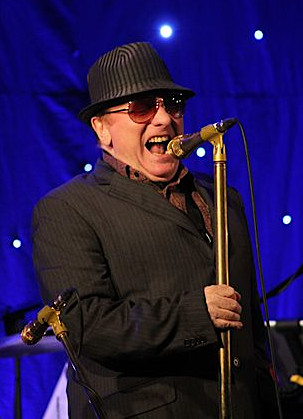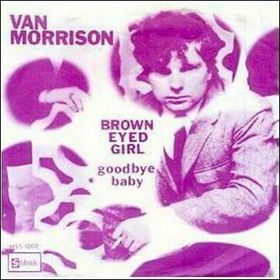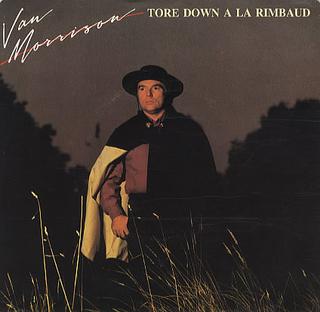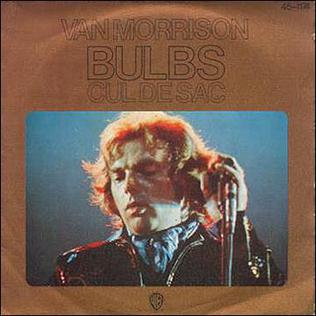
Sir George Ivan Morrison, known professionally as Van Morrison, is a Northern Irish singer-songwriter and multi-instrumentalist whose recording career spans seven decades. He has won two Grammy Awards.

"Brown Eyed Girl" is a song by Northern Irish singer and songwriter Van Morrison. Written by Morrison and recorded in March 1967 for Bang Records owner and producer Bert Berns, it was released as a single in June of the same year on the Bang label, peaking at No. 10 on the Billboard Hot 100. The song spent a total of sixteen weeks on the chart. It featured the Sweet Inspirations singing back-up vocals and is considered to be Van Morrison's signature song.

Veedon Fleece is the eighth studio album by Northern Irish singer-songwriter Van Morrison, released on 5 October 1974. Morrison recorded the album shortly after his divorce from wife Janet (Planet) Rigsbee. With his broken marriage in the past, Morrison visited Ireland on holiday for new inspiration, arriving on 20 October 1973. While there he wrote, in less than three weeks, the songs included on the album.

His Band and the Street Choir is the fourth studio album by Northern Irish singer-songwriter Van Morrison. It was released on 15 November 1970 by Warner Bros. Records. Originally titled Virgo's Fool, Street Choir was renamed by Warner Bros. without Morrison's consent. Recording began in early 1970 with a demo session in a small church in Woodstock, New York. Morrison booked the A&R Studios on 46th Street in New York City in the second quarter of 1970 to produce two sessions of songs that were released on His Band and the Street Choir.

Beautiful Vision is the thirteenth studio album by Northern Irish singer-songwriter Van Morrison, released in February 1982. It continued Morrison's departure from R&B at the time, instead favoring Celtic folk and American jazz in its music. As with many of Morrison's recordings, spirituality is a major theme and some of the songs are based on the teachings of Alice Bailey. Other songs show Morrison's Celtic heritage and reminiscence of his Belfast background.
The Caledonia Soul Orchestra was the band created by Northern Irish singer-songwriter Van Morrison in 1973. The band was named after an eighteen-minute instrumental outtake on the His Band and the Street Choir album.

Irish Heartbeat is the eighteenth studio album by Northern Irish singer-songwriter Van Morrison and is a collaboration with the traditional Irish musical group the Chieftains, released in 1988. It was recorded at Windmill Lane Studios in Dublin, Ireland, and reached number 18 in the UK album charts.
John Tropea is an American guitarist.

"Domino" is a hit song written by Northern Irish singer-songwriter Van Morrison. It is the opening track of his fourth studio album, His Band and the Street Choir. This song is Morrison's personal musical tribute to New Orleans R&B singer and pianist Fats Domino.
"Irish Heartbeat" is a popular song that was first recorded on Northern Irish singer-songwriter Van Morrison's 1983 album Inarticulate Speech of the Heart. A remake with the Chieftains was also included on Morrison's 1988 album, Irish Heartbeat, and was released as a single with "Star of the County Down" as the B-side.

Live at Montreux 1980/1974 is the first official DVD by Northern Irish singer-songwriter Van Morrison. It was released on 16 October 2006. The films consist of two separate performances by Van Morrison at the Montreux Jazz Festival in Switzerland. It was certified gold in May 2007 and platinum in June 2009.

"Tore Down a la Rimbaud" is a song written by Northern Irish singer-songwriter Van Morrison and included on his 1985 album, A Sense of Wonder.

"Rough God Goes Riding" is the opening song on the album, The Healing Game by Northern Irish singer-songwriter Van Morrison. The song reached No. 168 on the UK charts. One of the B-sides of the single, the alternative version of "The Healing Game", appears on all three editions of Morrison's 2007 compilation album Still on Top - The Greatest Hits. The other B-side "At the End of the Day" was released as a bonus track on the 2008 reissue of The Healing Game.

"Bulbs" is a song written by Northern Irish singer-songwriter Van Morrison. It was the only single to be taken from his 1974 album Veedon Fleece, with a B-side of "Cul de Sac" for the US release and "Who Was That Masked Man" for the UK release.
"You Don't Pull No Punches, but You Don't Push the River" is a nine-minute song by Northern Irish singer-songwriter Van Morrison. It appears on the album Veedon Fleece, released in 1974.

"Call Me Up in Dreamland" is a song that was written by Northern Irish singer-songwriter, Van Morrison and included on his 1970 album, His Band and the Street Choir. Brian Hinton describes the song as "life on the road, with 'radio' as a verb and laughing sax."

"Ivory Tower" is a song written by Northern Irish singer-songwriter Van Morrison and included on his 1986 album, No Guru, No Method, No Teacher. The song was also released as a single with the B-side "A New Kind of Man", from his previous album A Sense of Wonder. It charted at No. 21 on the US Mainstream Rock Tracks in 1986.
Jef Labes is an American keyboardist and musician. He is best known from his work with Van Morrison and Bonnie Raitt. Jef Labes has also arranged for string and woodwind instruments on numerous albums.

"Scandinavia" is an instrumental composition by Northern Irish singer-songwriter Van Morrison and is the closing track on his 1982 album Beautiful Vision.
"Fair Play" is a song by Northern Irish artist Van Morrison. The opening track on the 1974 album Veedon Fleece, it derived its name from Morrison's Irish friend, Donall Corvin's repeated use of the Irish colloquialism "fair play to you" as a wry compliment. The 3/4 ballad references Irish city Killarney, and poets Oscar Wilde, Edgar Allan Poe and Henry David Thoreau, and according to Morrison, the song derived from "what was running through his head", and marked a return to the stream of consciousness channeled song-writing that had not been evident since several of the songs contained in his 1972 album Saint Dominic's Preview. "Fair Play" was included on the 2015 compilation The Essential Van Morrison.














